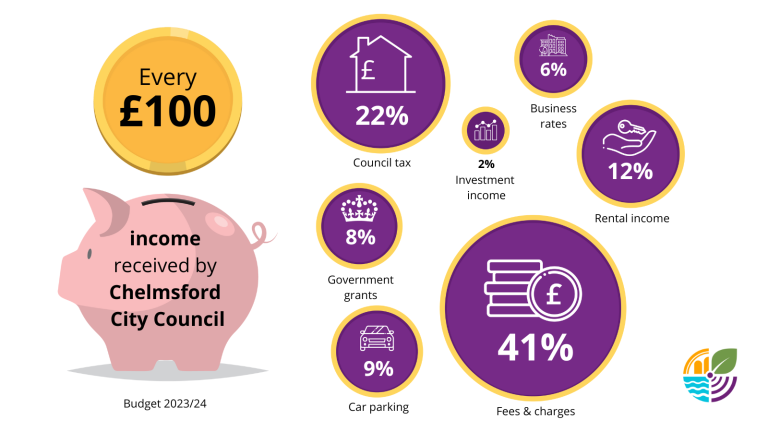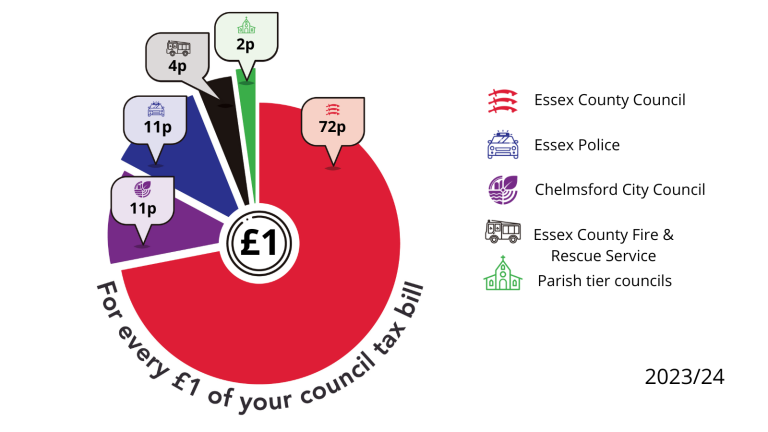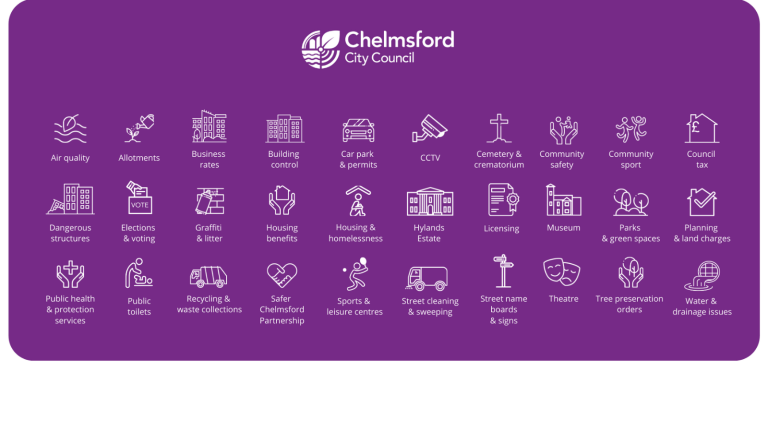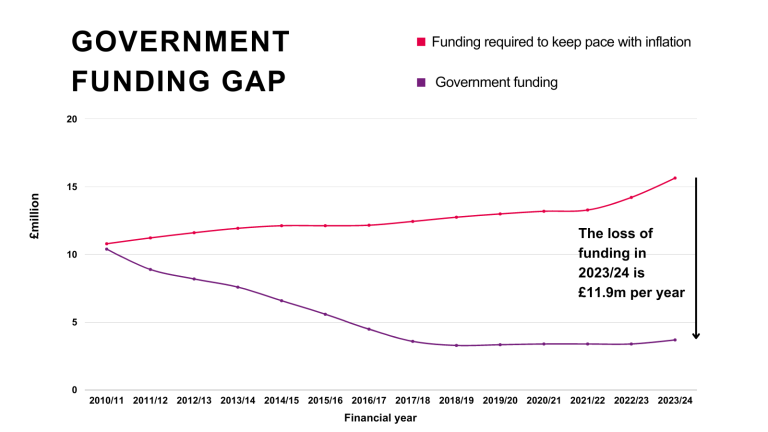Council issues warning over homelessness costs

Chelmsford City Council is warning that its rapidly growing housing bill presents a big risk to the council being able to balance its budget.
Projected increases in demand for temporary accommodation for Chelmsford residents who become homeless could cost the council an extra £3.5m over the next 18 months. This is all set out in the council’s mid-year budget review and financial forecast going to a council Cabinet meeting on 10 October.
Extra demand adding to ‘challenging financial position’
The cost to rent each property for homeless households is rising and so are the numbers of people needing temporary housing. This, plus ongoing, high inflation in the wider economy is making an already challenging financial position much worse.
The council estimates that an extra 150 households could present as homeless in the next financial year, on top of hundreds more already in temporary accommodation. The council has a statutory duty to prevent homelessness in the district and has to top up the funding each household receives from the Government to ensure anyone eligible for this help has a place to live. At the same time, an acute shortage of rental accommodation in the city, fuelled by private landlords selling up, is reducing options and driving up prices. Last year, the average council ‘top up’ for each homeless household was around £9,000.
More homeless households
Until now, most homelessness in the city has been caused when informal living arrangements with family and friends break down. Now, increasing numbers of evictions by private landlords looking to sell or raise rents to a level their tenants can’t afford is responsible for a growing proportion of cases. Domestic abuse is another concern and a key driver of homelessness in Chelmsford, responsible for nearly a quarter of applications to the council.
Funding frozen at 2011 levels
The Government provides money to councils to pay for accommodation for homeless households, but this is based on 2011 levels of Local Housing Allowance. This means that the council has to cover the shortfall between 2011 prices and today’s prices as part of its legal duty to prevent homelessness. Growing demand and an estimated 30% reduction in private sector rental properties in Chelmsford is leading to both higher prices and an increase in out-of-district placements.
The council report cautions that this overspend on temporary accommodation is so unsustainable that it could eventually lead to cuts in services and even bankruptcy if the Government does not step in to help find a solution. Chelmsford council is not alone in facing this challenge. In Essex, other district councils have similarly, very high numbers of homeless households.
Cllr Stephen Robinson, Leader of Chelmsford City Council says this growing housing crisis could be as big a problem for district councils as spiralling adult social care costs are for county and unitary councils.
““People understand some of the challenges faced by our homeless residents when they see people sleeping rough, but street homelessness is the tip of the iceberg. There are 450 families in temporary accommodation in Chelmsford and with an overheated rental market unlikely to cool down any time soon, we’re expecting more will need our help in the months to come.
Cllr Stephen Robinson, Leader, Chelmsford City Council
“Central Government funding for homeless households is frozen in time at 2011 levels – when you could still buy a brand-new Ford Fiesta for under £10k and the average house price in the city was around £219,000. There are almost no properties in Chelmsford available to rent at today’s Housing Benefit levels. This means the city council has to constantly top up this funding so that homeless households can have a roof over their heads.
“This legal duty to prevent homelessness is one of the most important services that district councils provide, and we are incredibly proud of the work our housing team does to help those in need. But the Government needs to understand the cost of making this happen. The increases we are seeing aren’t remotely sustainable if we have to carry on funding them the way we are now. We can’t fix this with belt-tightening or prudence; it’s a national crisis that local authorities can’t solve alone, and we are making these points to Government at every opportunity.”
High inflation still a problem
Housing isn’t the only challenge identified by the report; the impact of record inflation will be felt for years to come, according to the forecast. Many council services, which include kerbside recycling, community safety, leisure centres and managing the city’s parks are delivered by staff, in person. This year’s pay award, whilst below inflation for most employees and well short of the private sector, wasn’t funded by central Government and added more than £1.6 million to the current year’s budget.
This shortfall has been offset, in part, by a lower than expected energy bill for the council, along with some investment income. However, the forecast budget shortfall for 2024/25 is still £4.2m, which is more than three times the cost of running the council’s leisure facilities. This shortfall is forecast even if there is a council tax increase of 3% and some additional Government funding, neither of which are certain and won’t be confirmed until Christmas at the earliest.
Government funding gap for councils
In real terms, Government funding to local authorities has been cut significantly since 2010/11 and hasn’t kept pace with inflation. The report estimates the loss of Government funding to the council in 2023/24 to be in the region of £11.9 million a year, had it increased in line with inflation. The council’s chief executive, Nick Eveleigh, says it’s an incredibly challenging time for local authorities as councils experience record demand with fewer means at their disposal.
““It is not an overstatement to say that the situation councils are experiencing at the moment has never been this bad. Chelmsford City Council isn’t over-exposed to debt, and we don’t have risky investment deals that we’ve seen other authorities struggling with. But we are incredibly concerned by the fork in the road we now find ourselves at. Meeting the demands of temporary accommodation on top of all of the other pressures we face, could push us, and many other councils over the edge. The numbers don’t stack up anymore.
Nick Eveleigh, Chief Executive Officer, Chelmsford City Council
“We’re starting to see other councils either warning of or issuing section 114 notices citing temporary accommodation as a key factor. Fortunately, we’re not in that position yet, but the path we now take matters. There isn’t an easy fix – if there was we’d have done it already. We, and other councils, will do whatever we can to alleviate this pressure, but we need national fixes for a national problem.”
The challenge ahead
The mid-year budget review and forecast will be considered by the council’s Cabinet on Tuesday 10 October and work will begin to balance the £4.2m shortfall forecast for 2024/25 ahead of next year’s budget. Measures could include a review of spending on the council’s capital programme, making savings and efficiencies, identifying where any additional income might be found, and some cautious use of the council’s reserves.
Cllr Robinson says decisions made in the coming months will be crucial for councils.
““We recently raised our concerns with the Department for Levelling Up, Housing and Communities on behalf of both Chelmsford and local government as a whole. When councils with no history of high borrowing or governance issues are telling you that the housing crisis could fundamentally change the services they are able to provide, it is time to listen.
Cllr Stephen Robinson, Leader, Chelmsford City Council
“Three tough years of dealing with Covid and then record inflation have badly affected council income, but it’s the impact of the homelessness crisis that we are most concerned about. We desperately need more housing here in Chelmsford and we will use all of the means at our disposal to try to prevent homelessness and create more affordable accommodation in the city. But we also need collaboration and help from central Government before it’s too late.”
Watch the meeting online
The report and the Cabinet agenda can be viewed on the Chelmsford City Council website. You can watch the meeting on our YouTube channel as it happens, or afterwards as a recording.
Council tax makes up just over a fifth of Chelmsford City Council’s income, with a much larger share coming from fees and charges. Rental income and car parking charges both currently account for a higher proportion of council income than funding from the Government.

City council gets 11% of residents’ council tax
Although residents pay all of their council tax to Chelmsford City Council, the district only keeps 11% of this to provide its services to the people who live in the area. Most of the money collected goes to Essex County Council, which runs services like highways, adult social care and children’s services across the county. The rest is split between Essex Police, Essex County Fire & Rescue and parish tier councils.

An average band D property pays around £215 a year to Chelmsford City Council to provide more than 30 different services in the city, including housing and homelessness, recycling and waste collections, and running Chelmsford’s main cultural and leisure venues.


